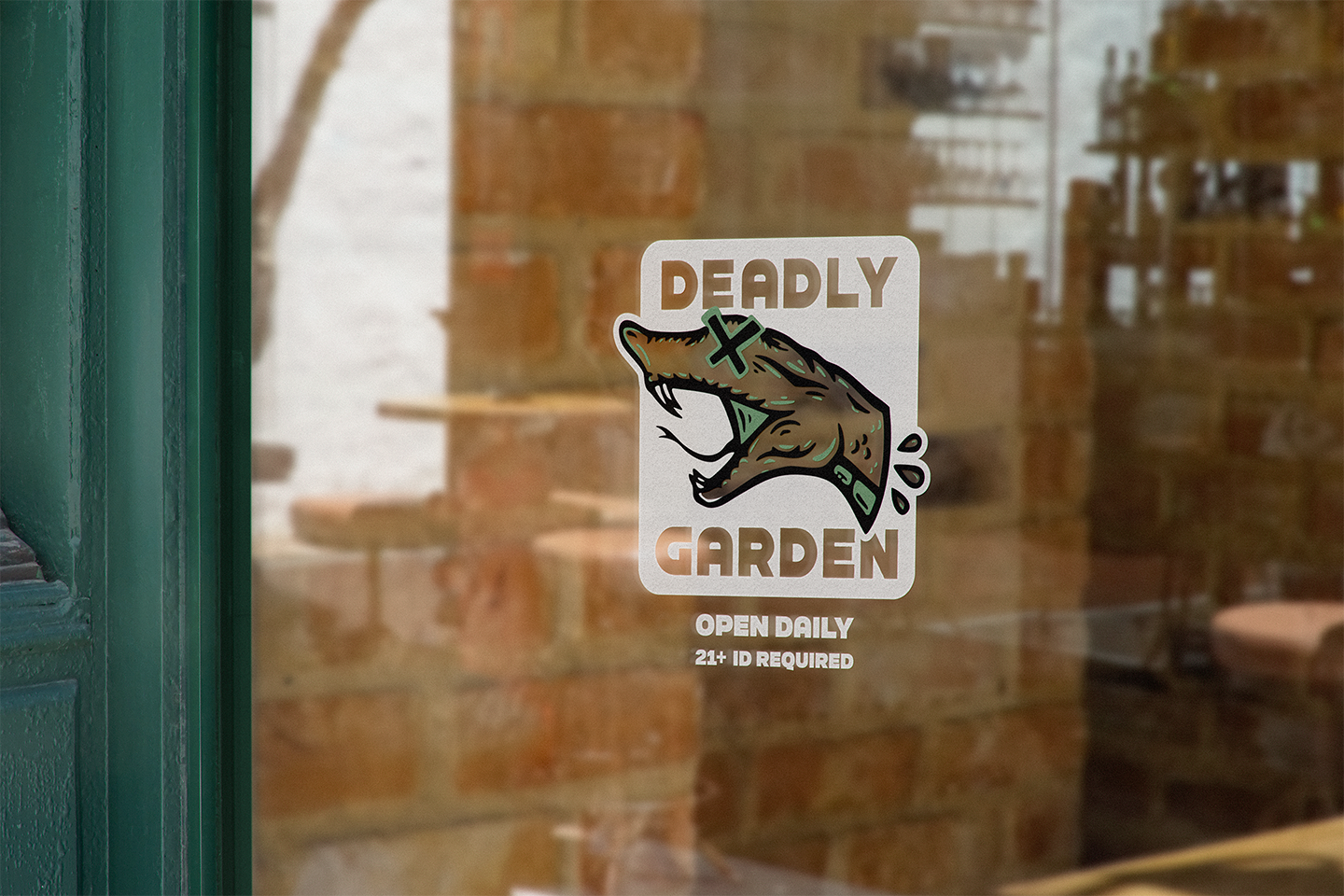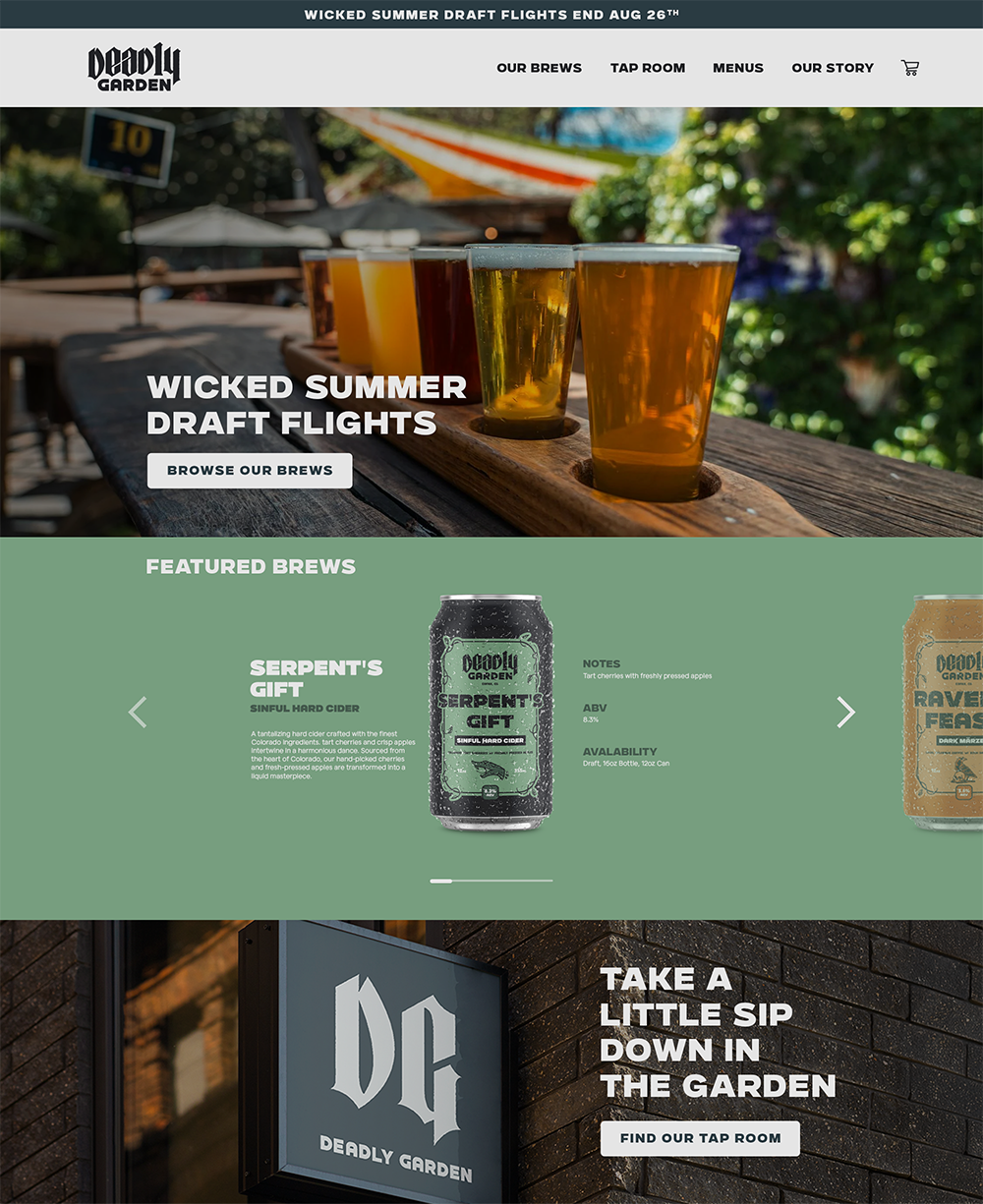
Deadly Garden
A Garden Full of Forbidden Fruit.
OVERVIEW
ROLE:
Web Development
Product Design
Graphic Design
TIMELINE:
170+ Hours
TOOLS USED:
Figma
Visual Studios
Shopify Web Builder
BACKGROUND
The online alcohol market is experiencing significant growth, projected to reach $41.74 billion by 2027, growing at a CAGR of 9.4% from 2022 to 2027. Craft breweries, like Deadly Garden, are increasingly seeking to leverage e-commerce to expand their reach beyond their physical locations. However, this presents unique challenges.
PROBLEM
Despite the growing popularity of buying alcohol online, many craft breweries face challenges in:
Maintaining Legal & Regulatory Compliance: Navigating complex and ever-changing regulations related to alcohol sales, including age verification, shipping restrictions, and marketing guidelines.
Ensuring Responsible Consumption: Effectively communicating responsible drinking messages and promoting a culture of moderation.
Creating a Differentiated Online Experience: Standing out in a crowded market with numerous competitors offering similar products and services
GOALS
Deadly Garden is looking to address these challenges and elevate the online craft brewery shopping experience by:
Build a Secure and Compliant E-commerce Platform: Develop a robust platform that adheres to all relevant regulations, including secure age verification, compliant shipping options, and responsible marketing practices.
Create a Captivating Brand Experience: Design a visually stunning and immersive website that reflects Deadly Garden's dark and alluring brand identity, showcasing their unique story and product offerings in a captivating way.
Enhance Customer Engagement: Foster a strong connection with customers through personalized experiences, exclusive online offers, and engaging content that highlights the brand's unique story and the craft of brewing.
Drive Sales and Growth: Optimize the website for conversions, streamline the checkout process, and leverage data analytics to identify areas for improvement and drive business growth.
EMPATHIZE
Exploring User’s Pain Points
RESEARCH APPROACH
To understand user needs and preferences, we conducted user research with a sample size of 23 participants. This included a combination of usability testing and user interviews. Participants were selected to represent Deadly Garden's target audience: urban professionals aged 25-45 with an interest in craft beverages.
For usability testing, participants were asked to navigate through the websites of several craft breweries, online liquor stores, and other businesses with a similar aesthetic, such as independent coffee roasters and artisanal food retailers. This provided valuable insights into user expectations and pain points within the online retail space.
WHAT WE FOUND
Our research revealed several recurring themes:
Participants frequently encountered difficulties with age verification processes, such as multi-step identity checks or the requirement to upload government-issued IDs. These cumbersome and sometimes intrusive methods often led to frustration and abandonment of the purchase journey.
FRUSTRATION WITH AGE VERIFICATION
LACK OF TRANSPARENCY & TRUST
Many participants expressed concerns about the security of online alcohol purchases, particularly regarding data privacy and the potential for fraudulent activity. The lack of clear information about shipping costs, delivery timelines, and return policies further eroded trust.
DIFFICULTY DISCOVERING PRODUCTS
Participants struggled to find specific products based on their preferences, such as flavor profiles, ingredients, or occasion. Many websites lacked robust search and filtering capabilities, making it difficult to narrow down options and find the desired products.
LIMITED BRAND STORYTELLING
Many websites lacked compelling brand stories and engaging content, failing to capture the attention and imagination of potential customers. These websites often felt generic and lacked personality, making it difficult to connect with the brand on an emotional level.
POOR MOBILE EXPERIENCE
Several websites were not optimized for mobile devices, resulting in poor navigation, slow loading times, and frustrating user experiences. Participants reported difficulty reading product descriptions, navigating menus, and completing purchases on their smartphones.
DEFINE
Establishing the User’s Needs
DEVELOPING A PERSONA
From our research, we noticed some patterns among our participants. They were interested in exploring new and unique beverages, appreciating high-quality craftmanship, and seeking sophisticated drinking experiences. However, they were often frustrated by cumbersome age verification processes, concerns about data privacy and security, difficulty discovering specific products, a lack of engaging brand storytelling, and the need for a seamless mobile experience.
Based on these insights, we created a persona: Julian, Craft Beverage Enthusiast
Julian Reyes
Craft Beverage Enthusiast
DEMOGRAPHICS
AGE: 26 - 35
LOCATION: Denver, CO
EDUCATION: Bachelor’s Degree
JOB: Marketing Manager
FAMILY: Married w/ No Children
TECHNOLOGY
COMPUTERS:
INTERNET:
SOCIAL MEDIA:
ONLINE SHOPPING:
EARLY ADOPTER:
Julian, a 32-year-old marketing manager living in Denver, is a true craft beverage enthusiast. He frequents local breweries and cocktail bars, savoring the atmosphere, engaging with bartenders, and discovering new and exciting offerings. He appreciates the artistry and craftsmanship behind each beverage, from the carefully selected ingredients to the meticulous brewing or mixing process.
Julian, like most millennials, enjoys the convenience of online shopping and ordering. He enjoys the ability to easily explore the menus of different breweries and order his favorites for delivery or pickup. He appreciates the ease of mobile ordering, allowing him to place orders while on the go and have his preferred beverages ready when he arrives at the brewery.
However, Julian often finds that the online experiences of many breweries fall short of his expectations. Websites can be difficult to navigate, product information is often limited, and the overall experience lacks the same level of craftsmanship and attention to detail as the beverages themselves. He yearns for an online platform that reflects the quality and artistry of the beverages, offering a seamless and enjoyable digital experience that complements the in-person experience.
PROBLEM STATEMENTS
To identify potential solutions, we conducted a brainstorming session using the "How Might We" framework. From this exercise, three key areas emerged as priorities for improvement:
How might we create an online platform that seamlessly integrates the in-person experience of visiting a craft beverage establishment with the convenience of online ordering?
How might we build trust and loyalty with customers by prioritizing data privacy and security, offering transparent and informative policies, and providing exceptional customer support?
How might we create an online platform that is both aesthetically pleasing and user-friendly, reflecting the dark and alluring brand identity of Deadly Garden while ensuring easy navigation and a seamless purchasing experience?
IDEATE
Creating the Framework
BRAINSTORMING
To translate our research findings into tangible design solutions, we began by creating user flows that mapped out the ideal user journey. We focused on streamlining the product discovery processes. With products being limited to just beverages made in house by Deadly Garden, we prioritized intuitive filtering options over a search bar. This allows users to still refine their search when looking into their catalog. Users can sort by beer style, flavor profile (e.g., hoppy, malty, fruity), ABV, availability (draft, bottles, cans), and even by occasion (e.g., "Date Night," "Game Day," "Special Occasion").
To enhance product pages, we aimed to provide comprehensive and accurate product information, including high-quality images, detailed descriptions, tasting notes, ingredient information, and even suggested food pairings. We also prioritized clear and concise information about brewing methods, brewing dates, and any special collaborations or limited releases. By carefully considering the user's needs and preferences, we were able to create a more intuitive and engaging online experience.
To address the challenges associated with the checkout process, we planned to leverage a robust e-commerce platform. This transition would allow us to streamline the checkout process, offer a variety of secure payment options, and integrate with third-party delivery services for a seamless and convenient customer experience. By simplifying the checkout process and offering a variety of payment options, we aimed to reduce cart abandonment and increase conversions with little additional effort on our end.
To ensure compliance with age-verification regulations for out-of-state shipments, we identified and integrated the Persona API into the e-commerce platform. This plugin utilizes advanced age verification technology to ensure that only authorized individuals can purchase and receive alcohol, mitigating legal and compliance risks while maintaining a smooth and user-friendly experience for customers.
Additionally, we explored the possibility of integrating a virtual tasting room experience, allowing users to explore the brewery virtually and learn more about the brewing process through interactive elements and engaging content.
PROTOTYPE & TEST
Putting all the Pieces Together
MAKING THE MOCKUPS
To bring our design vision to life, we created a series of interactive prototypes using Figma. We focused on key elements identified in the research and brainstorming phases, drawing inspiration from successful craft breweries like Deschutes Brewery, Stone Brewing, as well as other similar sites with overlapping demographics like Onyx Coffee Lab.
The Deadly Garden website was begun with the thoughtful creation of a compelling, easy-to-navigate homepage. What we focused on was delivering an experience that was immersive, visually grabbing, mirrored the dark and alluring aesthetic of the brand perfectly, and communicated vital information in a way that compelled visitors to learn more about it. A visually grabbing hero image or video immediately engaged visitors by showcasing the ambiance of the brewery, presenting a captivating product shot, or featuring a time-lapse of the brewing process. Below this was a prominent section highlighting seasonal brews, limited releases, or special collaborations—anything that was clearly meant to showcase the dynamic nature of the products on offer and really encourage exploration. Of course, high-quality product photography was a must here, along with concise yet tantalizing descriptions. A dedicated section offered crucial information regarding the brewery, encompassing its location, hours of operation, contact details, and an integration with Google Maps to facilitate convenient navigation. This section also presented a succinct yet engaging narrative about the brewery and its underlying philosophy, underscoring the dedication and artistry that characterizes each beverage. Strategically placed throughout the home page were clear, prominent calls to action to encourage visitors to view the full product catalog, place an order online, locate the brewery, or dig deeper into the brand's story.
Home Page Mockup
The "Our Brews" page was designed to be a captivating showcase of Deadly Garden's diverse and intriguing beverage offerings. Drawing inspiration from online retailers, we prioritized a user-friendly and visually appealing experience.
The page featured a prominent grid display showcasing high-quality images of each beverage. Hovering over a product revealed quick view information, including the beer style, ABV, and a brief description. Users could then easily click through to the full product page for more details.
A robust filtering system allowed users to easily navigate the extensive product catalog. Filters included beer style (e.g., IPA, Stout, Lager), flavor profile (e.g., hoppy, malty, fruity, dark), ABV range, availability (draft, bottles, cans), and even occasion (e.g., "Date Night," "Game Day," "Special Occasion"). This filtering system, inspired by successful e-commerce platforms like Amazon and Etsy, provided users with greater control and flexibility in their product discovery journey.
“Our Brews” Mockup
USABILITY TEST FINDINGS
Usability testing sessions were conducted with a new group of participants in order to gather feedback about the prototypes. Participants were given several tasks to perform, such as finding products, filtering products, adding products to their carts, and completing the checkout process. We observed them interacting, gathered feedback, and learned where to improve.
Informed by the feedback received, we did iterative improvements on the prototypes to address the usability issues and make the user experience better. This iterative process included layout and navigation changes, improvements in filtering options, and tweaking of the design of the product page. By continuously gathering user feedback and further refinements to our designs, we ensured that the final product would effectively meet the needs and expectations of Deadly Garden's target audience.
CONCLUSION
Let’s Wrap Things Up
The Deadly Garden website project has addressed the key issues identified in the research phase. By focusing on a user-centered design and taking the best practices from the industry, we have created a compelling online presence that reflects the brand's unique character and enhances the customer experience.
Filtering options with a user-friendly interface, visually appealing product display, and optimized checkout experience have seen a considerable increase in user engagement and general satisfaction. Although it is difficult to track the exact metrics for AOV—Average Order Value—and conversion rates for a brand new business and website, leading indicators are positive.
Notable findings include a high level of user satisfaction regarding both the aesthetic and functional aspects of the site; a significant reduction in cart abandonment compared to industry averages for similar e-commerce websites; and positive feedback about how easy it was to navigate and effectively explore product offerings.
Further, the ability to continuously monitor and analyze the traffic on the websites and user behavior will help in identifying further opportunities for optimization and improvement. This evidence-based approach will let Deadly Garden continuously enhance the digital experience and magnify its impact on business development.














